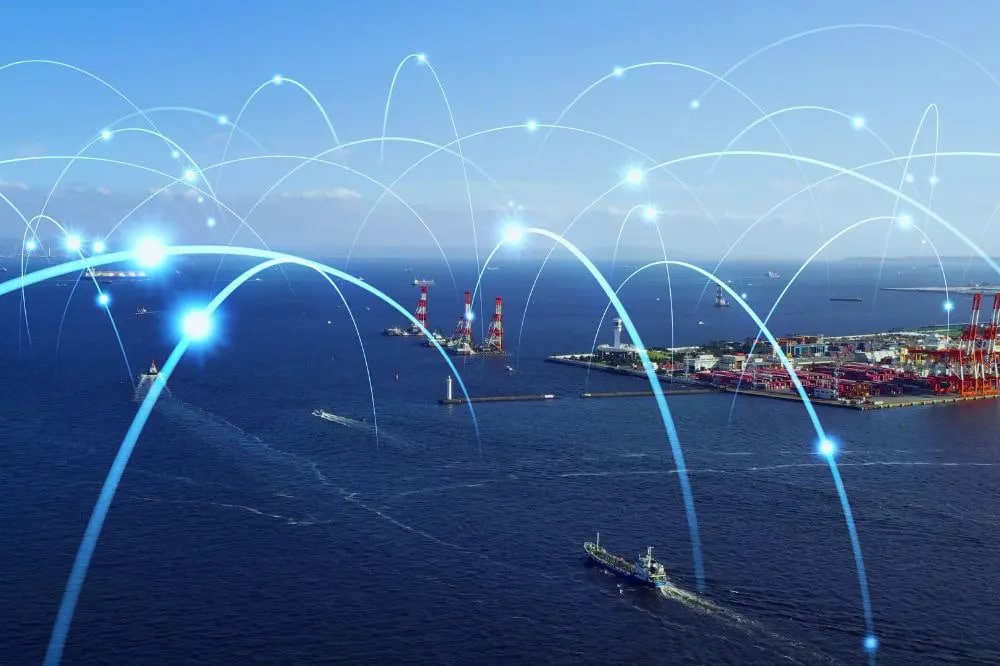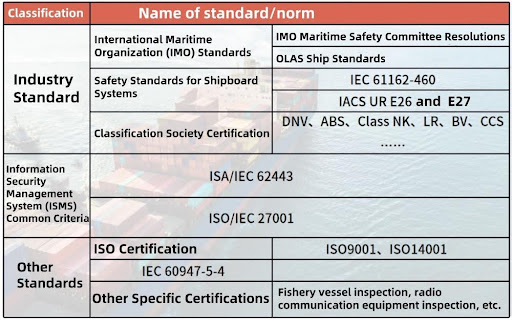Certified equipment is essential for safe transportation. A comprehensive list of marine certifications guarantees that ships adhere to strict safety regulations, safeguarding people, property, and the environment.
Marine equipment must pass stringent testing and certification in order to guarantee safe navigation. Serving as a "passport" for equipment, these certifications attest to adherence to strict safety regulations.
However, what particular requirements need to be fulfilled, and what certifications are necessary? Let's look at the necessary certifications for marine gear.
1. Industry Standards
International Maritime Organization (IMO) Standards
- IMO Maritime Safety Committee Resolution (IMO Resolution MSC.428 (98)
The inclusion of cyber risk management into a ship's safety management system (SMS) is required by IMO Maritime Safety Committee Resolution MSC.428 (98). In order to guarantee the security and dependability of ship operations, it offers the shipping sector a framework and recommendations for cyber threat response tactics.
- SOLAS Ship Standard
A fundamental maritime agreement known as the International Convention for the Safety of Life at Sea (SOLAS) sets minimum safety requirements for ship design, building, equipment, and operation.
Shipboard System Safety Standards
- IEC 61162-460
A cybersecurity standard called IEC 61162-460 was created expressly to improve the security of shipboard navigation and communication systems. By incorporating stronger security procedures to guard against cyberattacks and data leaks, it expands upon the IEC 61162-450 standard.
- IACS Cyber Security Specification
The UR E26 and E27 cybersecurity specifications are published by the International Association of Classification Societies (IACS). The cyber resilience of naval equipment and systems is the main focus of UR E26.
It sets down specifications for certain systems and equipment to guarantee that cybersecurity is taken into consideration during their design, integration, and maintenance. However, UR E27 governs cybersecurity for the entire ship, including the communication networks and control systems. It addresses the ship's entire resistance against cyber-attacks by taking a comprehensive approach to cybersecurity.
Classification Society Certification
Certification by a classification society is an essential step in the building and operation of ships. To guarantee adherence to global laws and standards, they keep an eye on and audit the planning, building, testing, and upkeep of ships. This contributes to property protection, marine environment preservation, and the safety of marine life.
One of the most prominent classification societies in the world is Det Norske Veritas (DNV). It helps ship owners and operators improve the sustainability, efficiency, and safety of their vessels by offering a broad range of certification and advising services to the marine sector.
2. Information Security Management System (ISMS) Common Criteria
ISA/IEC 62443:
The industrial automation and control systems (IACS) are the focus of this cybersecurity standard. It offers a thorough security architecture that includes system testing, security controls, and risk assessment for industrial settings. This standard aids businesses in recognizing and reducing cybersecurity threats in their operational technology (OT) settings.
ISO/IEC 27001
For information security management systems (ISMS), this is a globally accepted standard. It offers a structure for creating, putting into practice, preserving, and continuously enhancing an ISMS. The standard aids businesses in controlling the risks associated with information security, such as those pertaining to availability, confidentiality, and integrity.
3. Other Types of Certification
ISO Certification
The International Organization for Standardization (ISO) created this family of standards. These guidelines give businesses a framework for controlling operational quality, environmental effect, and other factors. The ISO 14001 environmental management system and ISO 9001 quality management system are two examples of popular ISO certifications.
IEC 60947-5-4
The International Electrotechnical Commission (IEC) has a special standard that addresses the electromagnetic compatibility (EMC) of electrical equipment used in offshore installations and ships. It guarantees that this equipment runs properly without interfering with other devices electromagnetically or being impacted by their interference.
Specific Certificates
Vessels may need additional specialized certificates, such as inspection certificates for radio communication equipment and fisheries vessels, depending on national laws and norms. These qualifications demonstrate how important safety management is in the maritime industry. Comprehensive certification for maritime communication equipment guarantees the safety and dependability of maritime networks in addition to product quality.
For example, Robustel's MG460 maritime network security gateway is the world's first to obtain IEC 61162-460 Ed. 3.0 certification issued by Det Norske Veritas (DNV). This certification meets the UR E26 and E27 network security requirements mandated by the International Association of Classification Societies (IACS) since July 1, 2024. It also conforms to the international standards of IEC 60945 for maritime equipment and the latest "Guidelines for Ship Network Security" from the Classification Society (CCS).
Furthermore, Robustel has earned security and quality certifications, including ISO/IEC 27001 information security management system, ISO 9001 quality management system, ISO 14001 environmental management system, and IEC 62444-4-1 network security system. By ensuring the safe transfer of data at sea and enabling captains and crews to take advantage of the convenience and peace of mind that technology offers, these certifications guarantee that the MG460 can create a strong security barrier.
The Bottom Line
For maritime equipment, those mentioned certifications are difficult and time-consuming to get. In addition to building a secure, dependable, and effective maritime network for shipping companies with the most exacting and thorough certifications, Robustel never stops working to deliver safe and dependable network communication solutions for international maritime companies.


